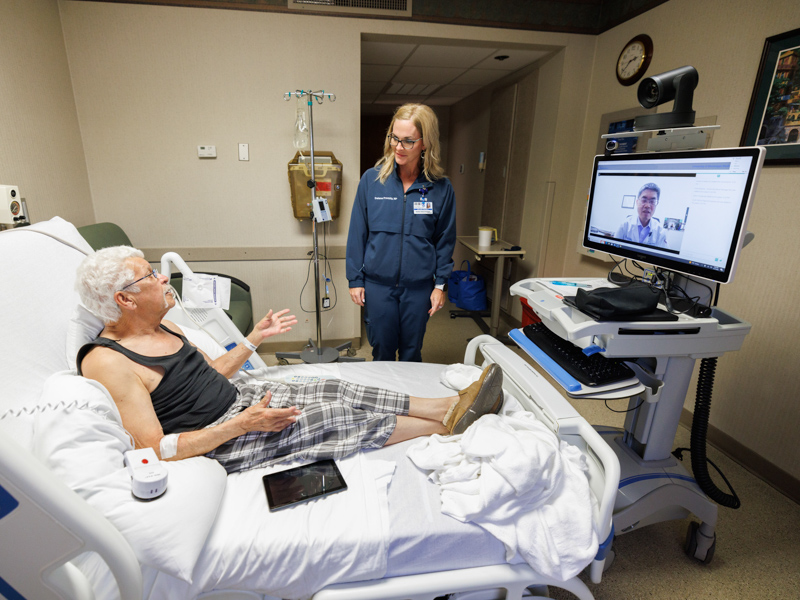Mental Health in the Digital Age: Navigating Opportunities and Challenges

The digital revolution has profoundly transformed nearly every aspect of modern life, including how individuals connect, work, learn, and manage their health. In the realm of mental health, the proliferation of digital tools such as telepsychiatry, mobile health applications, wearable devices, and artificial intelligence has created new pathways for delivering care and supporting patient well-being. For psychiatric nurse practitioners (PMHNPs), these developments present unique opportunities to enhance clinical practice, expand access to care, and provide more personalized treatment options. However, the integration of technology into mental health care also brings about significant challenges, including concerns about digital overuse, privacy risks, and the quality of virtual interventions. Digital platforms like telehealth services have revolutionized the patient experience by offering convenience and eliminating geographical barriers. Patients in rural or underserved areas can now receive timely mental health evaluations, therapy sessions, and medication management without the need to travel long distances. This advancement has been particularly beneficial during global crises such as the COVID-19 pandemic, which necessitated rapid transitions to remote care models. Digital mental health apps provide users with access to mindfulness exercises, mood tracking, and cognitive behavioral therapy (CBT) techniques, empowering them to actively engage in their treatment outside the confines of traditional clinical settings. In addition to improving access, digital technologies offer innovative solutions for mental health monitoring and prevention. Wearable devices can track physiological indicators such as heart rate variability, sleep patterns, and physical activity levels, offering valuable insights into a patient's emotional and psychological state. Artificial intelligence (AI) tools have emerged to support clinical decision-making by analyzing large datasets, predicting symptom trajectories, and identifying patients at risk of relapse. These advancements enable PMHNPs to deliver more proactive and precise interventions.
However, the digital age is not without its pitfalls. Excessive screen time, social media overuse, and the addictive design of many digital platforms can contribute to worsening mental health outcomes, particularly among adolescents and young adults. Concerns about online bullying, social comparison, and digital fatigue have become increasingly prominent. Furthermore, while digital interventions offer convenience, they may also pose challenges related to data security, ethical considerations, and the potential loss of therapeutic depth in virtual settings.
The Positive Impact of Digital Technology on Mental Health
The Challenges and Risks of the Digital Mental Health Landscape
The Role of PMHNPs in the Digital Era
Psychiatric nurse practitioners (PMHNPs) are uniquely positioned to bridge the critical gap between rapidly advancing technology and the compassionate, individualized care that remains the cornerstone of effective mental health treatment. As digital tools become increasingly embedded in clinical practice, PMHNPs are not only responsible for adopting these innovations but also for critically evaluating their impact on patient care. Their leadership is essential in ensuring that digital mental health interventions remain ethical, evidence-based, and firmly centered on the needs and safety of each patient. In this evolving landscape, PMHNPs must carefully assess digital mental health resources for scientific validity, therapeutic efficacy, and user safety. This includes thoroughly vetting telepsychiatry platforms, mobile mental health applications, and wearable devices to confirm they are backed by robust clinical research, adhere to data privacy standards, and are culturally sensitive and accessible to diverse patient populations. PMHNPs should also provide clear guidance to patients in selecting digital tools that align with their treatment goals while cautioning against unregulated or potentially harmful applications. Education is a key component of the PMHNP’s role in the digital era. Patients must be empowered with the knowledge to navigate technology in a healthy and balanced way. PMHNPs should actively promote digital hygiene practices, such as setting realistic screen time limits, curating social media feeds to reduce exposure to harmful content, and prioritizing in-person social interactions that foster genuine emotional connection. Introducing and encouraging regular digital detox periods can be particularly beneficial in reducing cognitive overload, improving sleep hygiene, enhancing concentration, and supporting emotional regulation.
In telepsychiatry settings, PMHNPs can play an instrumental role in enhancing the quality of remote therapeutic encounters. Building a strong therapeutic alliance virtually requires intentional strategies, including maintaining eye contact through the camera to simulate in-person presence, ensuring a private and confidential environment to foster patient trust, and clearly communicating the scope, benefits, and limitations of telehealth care. These thoughtful practices can help patients feel more engaged, respected, and emotionally supported during virtual sessions, mitigating the potential disconnect sometimes associated with remote therapy. Moreover, PMHNPs are vital advocates for equitable access to digital mental health solutions. They must recognize and address the technological disparities that exist across socioeconomic and geographic lines. This includes providing additional support and resources for patients who face challenges related to digital literacy, affordability of devices, or inconsistent internet connectivity. PMHNPs should also advocate for the development and implementation of digital interventions that are linguistically appropriate, culturally competent, and accessible to marginalized populations, ensuring that the benefits of digital mental health care are distributed equitably across all communities. By embracing this multifaceted role, psychiatric nurse practitioners can lead the integration of technology into mental health care in ways that are thoughtful, inclusive, and aligned with the highest standards of clinical excellence. Their leadership will be essential in safeguarding the therapeutic integrity of mental health practice in the digital age while expanding access and improving patient outcomes.

Digital Ethics and Data Security in Mental Health Care
The increasing reliance on digital platforms in mental health care necessitates a vigilant, proactive approach to ethics, patient privacy, and data security. As telepsychiatry, mobile health apps, and artificial intelligence (AI)-driven interventions become integral to psychiatric practice, safeguarding patient confidentiality must remain a top priority. Psychiatric nurse practitioners (PMHNPs) are entrusted with ensuring that the digital tools and platforms they employ or recommend are fully compliant with HIPAA regulations and uphold the highest standards of data security. This includes verifying that telehealth platforms and app-based interventions utilize end-to-end encryption, secure data storage, and multi-factor authentication to protect sensitive patient information from unauthorized access and cyber threats. Equally important is fostering patient understanding and autonomy regarding digital privacy. PMHNPs must prioritize clear, transparent consent processes that thoroughly explain how patient data will be collected, shared, stored, and potentially analyzed. Patients should be actively informed of the risks and benefits of participating in digital mental health programs, and they must be provided with opportunities to ask questions and withdraw consent if they feel uncomfortable at any stage. Establishing these transparent communication practices fosters trust, empowers patients to make well-informed decisions, and enhances the therapeutic alliance in both virtual and app-based care. PMHNPs also have an essential role in remaining vigilant against emerging cybersecurity threats, such as data breaches, hacking attempts, and vulnerabilities within mobile applications. Given the increasing sophistication of cyberattacks, practitioners must advocate for continuous improvements in digital safety protocols and support organizational investments in cybersecurity training and infrastructure. Staying current with evolving regulatory frameworks and actively participating in professional discussions regarding digital ethics can further strengthen a PMHNP’s ability to protect patient welfare in the digital domain. Ethical considerations also extend to the responsible use of AI and algorithm-based mental health tools, which, while promising, carry inherent risks. PMHNPs must critically assess whether these algorithms introduce or perpetuate biases, particularly those that may disadvantage already marginalized groups. Algorithms trained on incomplete or non-representative datasets can inadvertently reinforce systemic disparities in mental health care, leading to inequitable treatment recommendations or misidentification of clinical needs. As gatekeepers of ethical practice, PMHNPs must advocate for the development of transparent, accountable AI systems and call for rigorous, ongoing validation studies that address these potential biases.
The Future of Mental Health in the Digital Landscape
Conclusion
FAQs
- How does digital technology benefit mental health care?
Digital technology enhances mental health care by improving accessibility through telehealth, providing therapeutic apps, enabling symptom tracking, and fostering virtual support communities that promote engagement and self-management. - What are the risks of excessive digital use on mental health?
Prolonged screen time and social media use can contribute to anxiety, depression, sleep disturbances, social comparison, and reduced real-world social interaction, especially among adolescents and young adults. - How can PMHNPs support patients in managing digital stress?
PMHNPs can educate patients on digital hygiene, recommend screen time limits, promote digital detox periods, encourage curating social media feeds, and support building healthy offline relationships. - What are digital hygiene practices?
Digital hygiene involves mindful technology use, including regular breaks from screens, limiting exposure to negative content, securing personal data, and maintaining healthy online boundaries. - How can telepsychiatry maintain strong therapeutic relationships?
PMHNPs can foster strong therapeutic alliances in telepsychiatry by ensuring privacy, maintaining eye contact via video, using empathetic communication, and being transparent about telehealth limitations. - What are the ethical concerns in digital mental health care?
Key ethical concerns include patient confidentiality, data security, informed consent, algorithmic bias, and the potential misuse of personal health information in unregulated digital platforms. - How can PMHNPs evaluate mental health apps?
PMHNPs should assess mental health apps for clinical validity, privacy safeguards, cultural sensitivity, usability, and adherence to evidence-based therapeutic principles before recommending them to patients. - What are some future trends in digital mental health?
Emerging trends include virtual reality therapy, AI-powered chatbots, gamified CBT applications, wearable devices for real-time monitoring, and personalized digital therapeutics. - How can PMHNPs ensure equitable access to digital mental health care?
PMHNPs must address technology access disparities, provide support for low-tech users, advocate for culturally inclusive digital resources, and promote affordable digital care options. - Why is digital literacy important for PMHNPs?
Digital literacy empowers PMHNPs to critically evaluate new technologies, guide patients in safe digital use, protect patient data, and effectively integrate digital tools into clinical practice.




